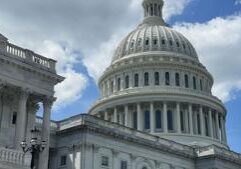
Everyday Economics: Jobs data returns as government reopens
With the government shutdown finally over, this week brings a double dose of good news: federal workers start receiving paychecks again, and economic data collection resumes. Both matter more than you might think.
Why the Reopening Matters
When federal workers and contractors receive their paychecks, they resume spending on everyday goods and services – providing a modest boost to economic activity. The longer a shutdown persists, the larger its drag on GDP growth through this reduced consumption channel and its spillover effects.
More importantly for markets, the data blackout is ending. The Federal Reserve has been flying blind, making monetary policy decisions without fresh government data. This week’s release of the delayed September jobs report – though backward-looking – will provide crucial visibility on whether employment had begun to fall before the data went dark.
Jobless claims had stopped rising, and private-sector indicators suggested hiring remained soft even as layoffs stayed low. While we’ll likely never see October’s data because of the collection gap, having the September and November reports will give the Fed at least some visibility heading into its December rate decision.
This Week’s Housing Focus
The main event this week will be housing data, starting with the NAHB Housing Market Index (builder confidence) on Tuesday.
Builder confidence should show improvement. The recent drop in mortgage rates has meaningfully improved affordability, spurring stronger-than-typical autumn activity.
Zillow data is already telling an unusual story. New listings, which fell 3% year-over-year in August, reversed course to show 3% growth in September. For context, new listings typically plummet 9% from August to September (based on the seven-year average), making this year’s modest 2% monthly decline remarkably resilient.
After August’s summer doldrums, this unseasonable strength from both buyers and sellers suggests October’s existing home sales data (released next week) could surprise to the upside. Watch for a modest increase in transaction volumes – a welcome change from the frozen market conditions we’ve seen for much of 2024.
Latest News Stories

Will County Committee Denies Appeal for Crete Township ‘Tiny Home’ Permit

Judge: Biden-era decree deal requires release of 600+ from ICE detention

Poll: Majority believe free speech in U.S. headed in wrong direction

Illinois quick hits: Chicago treasurer to boycott U.S. securities to protest against Trump; Governor marks opening of new union training center; Illinois farms expected to lose $67.2 million a year

Trump signs executive order to improve foster care

Hegseth announces Operation Southern Spear, targeting narco-terrorists

Justice Department accuses California of racial gerrymandering in redistricting plan

Illinois quick hits: WARN Act reporting shows 1,600 job losses in October

Pritzker, alders oppose Chicago tax plans, property tax hike could be next

State Department designates European Antifa groups foreign terror organizations

NetChoice scores legal win in social media warning lawsuit

Union Pacific–Norfolk Southern merger draws more support as critics push back


